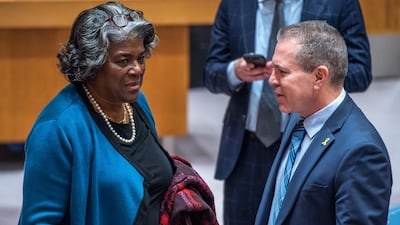Live updates: Follow the latest news on Israel-Gaza
The US is lobbying members of the UN Security Council to endorse a new Gaza ceasefire plan presented by President Joe Biden, but some parties have sought changes, saying the document is one-sided.
The one-page proposal, seen by The National, welcomes the deal announced on Friday and calls on Hamas to “fully accept and implement its terms without delay and without condition”.
In a statement, US ambassador to the UN Linda Thomas-Greenfield called on the council to “insist that Hamas accept the deal”.
But the document makes no mention of Israel accepting the deal, even though far-right members of Prime Minister Benjamin Netanyahu's cabinet have said he must reject it or they would bring the government down.
Diplomatic sources told The National that the “vast majority” of council members believe the draft “should be more balanced”.
“There are also some questions about the content of the so-called agreement that they are supposed to support,” one source said.
They said they are waiting for the US response to their comments and the “announcement of the next steps”.
Russia, meanwhile, has requested more time before submitting its comments.
On Tuesday, Secretary General Antonio Guterres visited US Secretary of State Antony Blinken to thank him for “his public support of the proposed deal to reach a comprehensive ceasefire in Gaza”.
Mr Guterres's spokesman Stephane Dujarric said on Wednesday that the proposal is an “avenue to peace that we hope the leaders in Israel, the leaders of Hamas, will grab".
“And I think there is consensus among the nations in the region and beyond to support this effort,” Mr Dujarric said.
The latest proposal calls for an initial six-week ceasefire with an Israeli military withdrawal from populated areas of Gaza and the release of some hostages, while “a permanent end to hostilities” is negotiated through mediators. Its fate remains uncertain.
It seeks to build on a deal Hamas accepted this year by keeping a ceasefire in place as negotiations continue, with the aim of reaching a permanent end to hostilities, a long-standing Hamas demand.
Richard Gowan, the UN director for the International Crisis Group, told The National that while a UN Security Council resolution supporting the ceasefire proposal could lend it “extra credibility", it would not be the determining factor in the plan's success or failure.
“I suspect that Netanyahu in particular will firmly reject the idea that the UN has any bearing on his choices," Mr Gowan said.
"Israel has made ignoring calls from the UN a point of principle since October. It is not going to start now."
As questions linger about Gaza's future, he said supporting the resolution could be a preliminary step towards determining the role the UN might play in the long-term stabilisation and rebuilding of Gaza.
Israel and the Palestinian territories have generated more UN resolutions than any other crisis-prone region, resulting in consistently strained relations between Israel and the UN.


